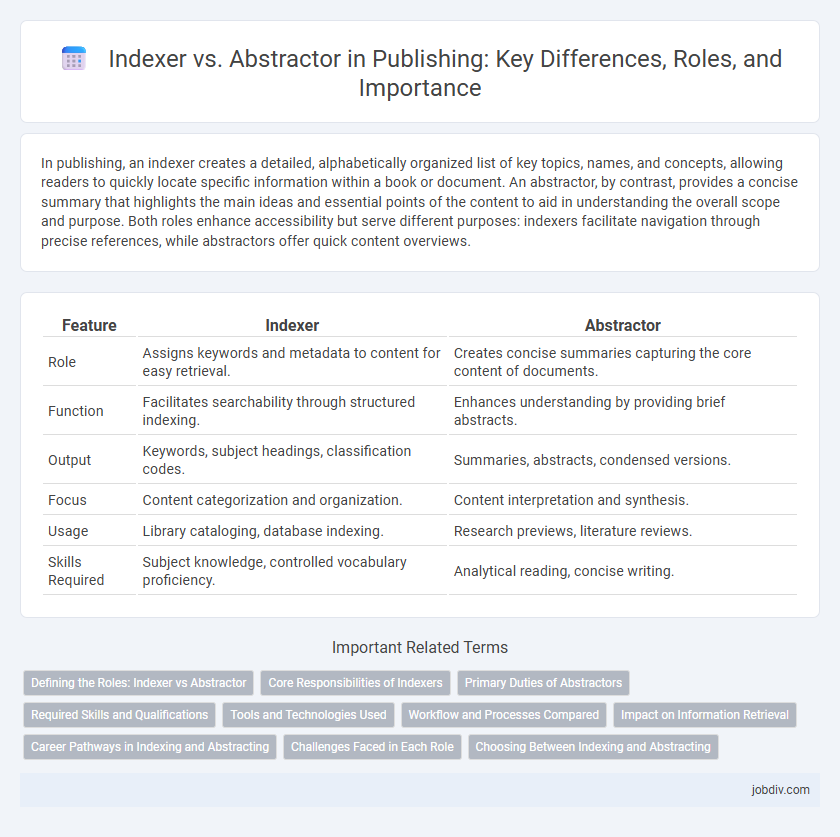In publishing, an indexer creates a detailed, alphabetically organized list of key topics, names, and concepts, allowing readers to quickly locate specific information within a book or document. An abstractor, by contrast, provides a concise summary that highlights the main ideas and essential points of the content to aid in understanding the overall scope and purpose. Both roles enhance accessibility but serve different purposes: indexers facilitate navigation through precise references, while abstractors offer quick content overviews.
Table of Comparison
| Feature | Indexer | Abstractor |
|---|---|---|
| Role | Assigns keywords and metadata to content for easy retrieval. | Creates concise summaries capturing the core content of documents. |
| Function | Facilitates searchability through structured indexing. | Enhances understanding by providing brief abstracts. |
| Output | Keywords, subject headings, classification codes. | Summaries, abstracts, condensed versions. |
| Focus | Content categorization and organization. | Content interpretation and synthesis. |
| Usage | Library cataloging, database indexing. | Research previews, literature reviews. |
| Skills Required | Subject knowledge, controlled vocabulary proficiency. | Analytical reading, concise writing. |
Defining the Roles: Indexer vs Abstractor
Indexers organize content by assigning specific subject terms or keywords to facilitate precise information retrieval in databases, enhancing search efficiency and accuracy. Abstractors create concise summaries of documents that capture essential concepts and key points, enabling quick assessment of content relevance. Both roles are critical in publishing workflows, with indexers optimizing discoverability and abstractors supporting content comprehension.
Core Responsibilities of Indexers
Indexers primarily focus on assigning precise and relevant keywords or subject headings to publications, enabling efficient retrieval and organization within databases. Their core responsibilities include analyzing content to identify key concepts, categorizing information according to established taxonomy standards, and ensuring consistency across indexing entries. Accurate indexing enhances discoverability and supports research by bridging users to pertinent literature quickly.
Primary Duties of Abstractors
Abstractors primarily distill complex content into concise summaries, enabling efficient retrieval and comprehension of published materials. Their duties involve extracting key concepts, themes, and essential information to provide clear, accurate abstracts that support research and indexing processes. This precise summarization enhances discoverability and relevance in academic and professional publishing databases.
Required Skills and Qualifications
Indexers require strong analytical skills, attention to detail, and expertise in information organization to create accurate and comprehensive indexes. Abstractors need excellent summarization abilities, proficiency in technical or subject-specific language, and experience in extracting key concepts from extensive texts. Both roles demand familiarity with publishing standards, strong research skills, and often a background in library science or related fields.
Tools and Technologies Used
Indexers utilize controlled vocabularies, taxonomies, and automated indexing software like Apache Lucene or Elasticsearch to assign precise, standardized subject terms for efficient document retrieval. Abstractors often rely on natural language processing (NLP) tools and summarization algorithms such as GPT-based models or specialized platforms like AutoSummarizer to generate concise, meaningful abstracts capturing the essence of the content. Integration of AI-driven technologies enhances both indexing accuracy and abstract quality, enabling improved discoverability and user engagement in digital publishing platforms.
Workflow and Processes Compared
Indexer processes involve assigning standardized subject headings or descriptors to content, ensuring precise retrieval through controlled vocabularies and hierarchical taxonomies. Abstractor workflows focus on summarizing key information by condensing essential concepts into concise abstracts, enhancing quick comprehension and relevance assessment. Both roles streamline content discoverability, but indexers prioritize metadata accuracy while abstractors emphasize content interpretation and summarization efficiency.
Impact on Information Retrieval
Indexers assign specific subject headings and keywords to documents, enhancing precision in information retrieval by enabling accurate subject-based searches. Abstractors summarize the core content of documents, improving recall by providing users with concise descriptions that help identify relevant materials even when exact search terms are absent. The combined use of indexing and abstracting significantly optimizes search efficiency and effectiveness in digital libraries and databases.
Career Pathways in Indexing and Abstracting
Careers in indexing emphasize organizing information through precise keyword tagging and metadata creation, facilitating efficient retrieval in databases and catalogs. Abstracting professionals focus on summarizing content to provide concise overviews, enhancing searchability and aiding researchers in quick content assessment. Both career paths require strong analytical skills and expertise in subject matter to improve digital libraries, academic publications, and information management systems.
Challenges Faced in Each Role
Indexers often grapple with accurately categorizing vast volumes of content while maintaining consistency and relevancy across diverse subject areas. Abstractors face the challenge of distilling complex information into concise summaries that capture the essence without losing critical details or introducing bias. Both roles require keen attention to detail, subject-matter expertise, and the ability to interpret nuanced information to support effective information retrieval and user comprehension.
Choosing Between Indexing and Abstracting
Choosing between indexing and abstracting hinges on the desired depth of content representation for publishing databases; indexing assigns precise subject terms for efficient retrieval, while abstracting summarizes the core ideas to provide context. Indexing enhances discoverability through standardized keywords and controlled vocabularies, ideal for large-scale bibliographic searches. Abstracting offers richer insights by capturing detailed content nuances, beneficial for readers needing quick comprehension without full-text access.
Indexer vs Abstractor Infographic

 jobdiv.com
jobdiv.com